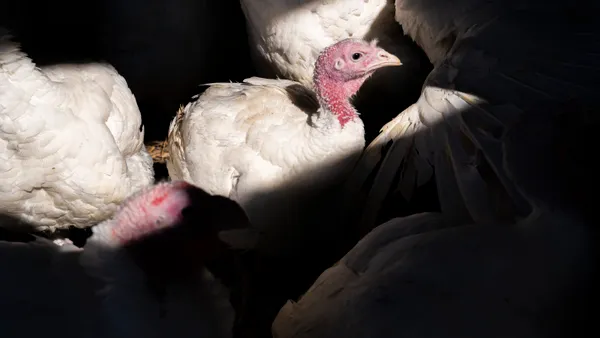Dive Brief:
- The U.S. meat market could descend into "chaos" unless federal lawmakers take action on state animal welfare requirements such as California's Proposition 12, Agriculture Secretary Tom Vilsack said at a congressional hearing on Wednesday.
- Proposition 12, which governs housing requirements for pigs, was approved by California voters in 2018 and upheld by the Supreme Court in 2023. As more states regulate farm production practices, there is “the possibility of 50 different sets of rules and regulations, which obviously creates serious concerns for producers,” Vilsack said.
- "If we don't take this issue seriously, we're going to have chaos in the marketplace," Vilsack said. "Because there's nothing preventing any state from doing what California does."
Dive Insight:
Pork producers say California and others pursuing animal welfare requirements are running afoul of interstate commerce rules that restrict states from impairing trade outside their boundaries. Costs to comply with a single state's regulation, stakeholders say, could lead to price volatility across the entire U.S. market.
The pork industry is already grappling with weak demand and high supply — a situation exacerbated by difficulties entering the California market in the wake of Prop 12. Producers unable to sell their products in California have flooded the market in other states, dampening prices, according to House Agriculture Chairman Glenn Thompson.
However, as the Supreme Court ruled last May, only Congress can regulate interstate commerce. Although lawmakers have discussed addressing the industry's Prop. 12 concerns in the upcoming farm bill, Vilsack expressed doubt that Congress could tackle the issue without opening up more difficult conversations around states' rights.
"It is a little bit difficult to create consistency within this Congress and within this country on this issue of states rights," Vilsack said. "Because if you apply this standard, then you're going to have to discuss some of the more difficult issues — social issues, guns, abortion, etc."
A yet-to-be-released preliminary analysis by the USDA shows certain pork prices have risen as much as 41% since Prop. 12 was implemented on Jan. 1, Thompson said.
Vilsack said the USDA has made some efforts to provide relief to the pork industry, with the agency purchasing $100 million worth of products in its feeding programs. USDA is also focused on building up local and regional farm supply chains, which allows smaller producers to lean away from a national distribution model, he said.
"I think we're gonna go through a bumpy period here where farmers have to basically make a decision about whether they're going to participate in that market or whether they're going to be more localized," Vilsack said.












